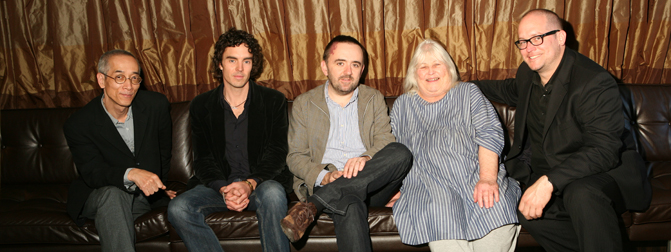Over the last week, our jury has been fortunate to see some wonderful, difficult, and rewarding films, and while the nature of this kind of competition means that sometimes it can be very easy to find a clear winner; other times, more than one entry will share the qualities of a great film, an important film.
As I revealed in yesterday’s post, “Balibo” pipped the post to win the FIPRESCI Award, but ours was a difficult decision to grapple with, as Robert Connolly’s film narrowly overtook the near-perfection of Kore-eda Hirokazu’s sublime human drama “Still Walking”.
This competition offered films that subvert the precarious balance between form and content—think “Dreamland”, Ivan Sen’s experimental journey into one man’s alien-fuelled psychosis, or David Caesar’s “Prime Mover”, a contemporary fairytale about love, trucks, and methamphetamines. These films ask us to suspend our normally comfortable relationship with conventional storytelling, and journey into uncharted and sometimes frightening waters.
Some stories here tell of a search for meaning in a difficult and challenging life—of individuals coming to terms with themselves and their place; where they sit in a relationship, in a family, or in the wider world. Ashghar Farhadi’s “About Elly”, which won the NETPAC Award with “Agrarian Utopia” by Uruphong Raksasad, examined the politics of romance and relationships in Iran; while “Flowers of the Sky” by Akasa Kusum—and featuring a guest appearance at BIFF of veteran actress and singer, Malani Fonseka—offered a sentimental excursion into the fading career of a star, scandalised in her retirement by a brush with celebrity shenanigans. In another contemporary fairytale, Kim So-yong’s heartbreaking, but very satisfying “Treeless Mountain”—one of my true favourites of the festival—took on the perspective of two very young children who desperately try to cope with their mother’s abandonment. And in the German-Kazakhstani-Russian coproduction “Songs from the Southern Seas”, Marat Saralu throws paternity into question in a very funny, often poignant look into the lives of two neighbouring families.
There have been tales that negotiate the politics of difference, where one is sometimes forced to come to terms with contradictions against the colour of their skin, the intricacies of their religion or sexuality, or the complexities of their minds. Khoa Do’s “Missing Water” pulls all the emotional strings in his very theatrical experiment about Vietnamese boat people; Yesim Ustaoglu opens “Pandora’s Box” with the revelation that an ageing mother’s senile dementia will forever change the lives her children; and in “Gulabi Talkies”, Girish Kasaravalli tells the tale of the charming midwife Gulabi, whose minority status as a Muslim in a mostly Hindu eventually lead to heartbreak. Finally, Brillante Mendoza’s sprawling, chaotic, and often deafening “Service” opened a window into the anarchy of a dying Filipino cinema complex relegated to screening porn films and sheltering perverts.
But one common trope that resonated throughout this competition was the struggle that comes with dealing with the consequences of our decisions or our obsessions. And I think that the portrayal of this struggle and its implications in “Balibo” ultimately helped us to make our decision.
This important film reminds us of the naivety, idealism and opportunism of youth, and the cynicism and exhaustion of age. It tells of the changing face of our media and its approaches in conveying truth and perceptions of truth. In some ways, it is a conventional thriller, and yet even with the certainty of history tempering its direction, the ending manages to be shocking and confronting.
Finally, most importantly, “Balibo” uses three intimate, very personal and tragic stories to paint a broader picture of the birth pangs of one of our youngest nations. In doing so, its filmmakers remind us that there are still questions to be answered, still stories to be told, still people who need to be heard. Those looking for even more information about the film should visit its excellent website, which reveals a raft of authentic evidence and background material behind the story told by Robert Connolly, David Williamson, Tony Maniaty, and Tony LaPaglia.
As the 2009 St George Bank Brisbane International Film Festival drew to a close, and drinks began to flow possibly for the last time in a festival context in the Regent Bar, I caught up with Damon Gameau who played the fatally charismatic Greg Shackleton in Robert Connolly’s “Balibo”. As the film’s other star and prime mover, Tony LaPaglia tirelessly worked the room and happily mixed with the punters, Damon told me of his first meeting with widower, Shirley Shackleton, and her initial unease at encountering the ‘ghost’ of her husband; that as she became comfortable with ‘Damon the Doppleganger’, Shirley eventually insisted that the portrayal of her husband in the film be ‘warts-and-all’, not some kind of hagiography.
But the clincher of the festival for me was when Damon told me of a haunting moment when the film recently screened in Victoria. In the wake of the screening, he felt a tugging on his trousers and looked down to see an eight-year-old East Timorese girl gazing up at his face in wonder, her eyes filled with tears—“You’re alive,” she gasped in relief. This single, short anecdote pays testament to the power of cinema, and the various strengths of an astonishing film.

“Balibo” Director Robert Connolly (centre) and lead actor Damon Gameau (second from left) with FIPRESCI Jurors
Kenichi Okubo (Far Left) Tina Kaufman (second from right) and Tim Milfull (Far Right). Photo by Jimmy Malecki.
